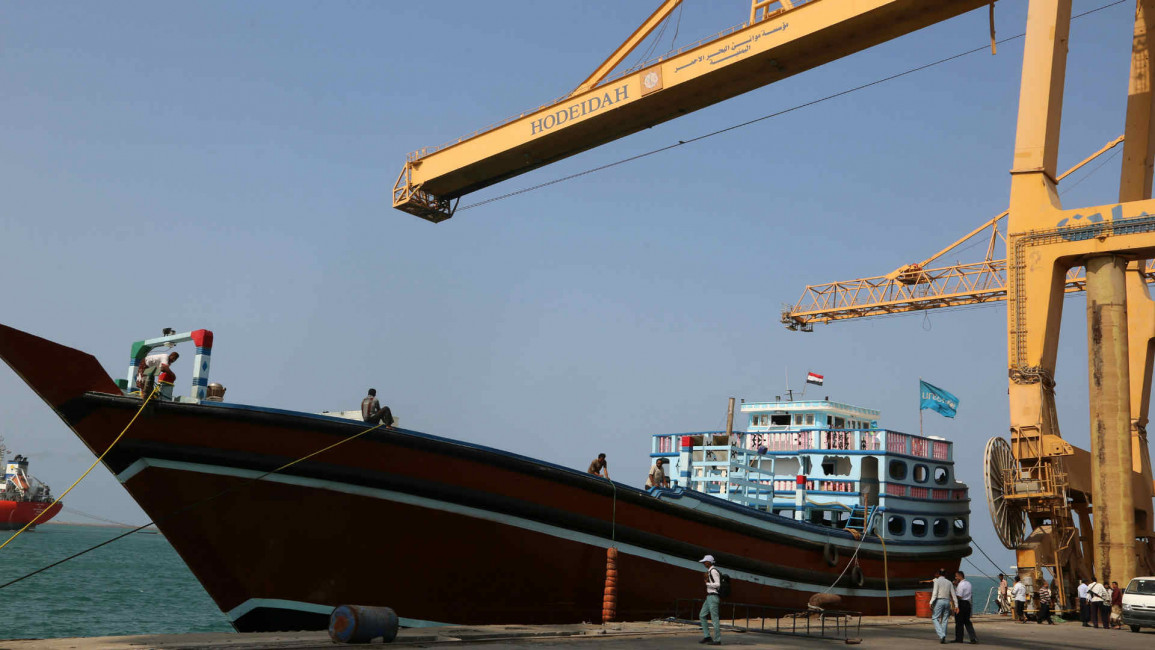Yemen's lifeline Hodeidah port still stifled by 'de facto blockade'
The assessment by humanitarian and port officials comes as Saudi Arabia and its regional allies push into the fourth year of their military intervention in Yemen.
The operation, launched in March 2015 with the goal of eradicating Zaydi-Shia Houthi rebels and restoring Yemen's internationally-recognised government to power, has contributed to what the United Nations calls the world's worst humanitarian crisis.
The UN Security Council warned earlier this month that conditions in Yemen are deteriorating and having a "devastating" impact on civilians, with 22.2 million - of the country's total population of 27.6 million - now in need of humanitarian assistance.
The status of Hodeidah, the country's largest seaport and gateway to the majority of its aid-dependent population, offers a window into the nation's dire plight.
In February, food imports were half of the monthly national requirement, according to the United Nations agency for humanitarian affairs.
The world body said those food shipments, critical to a nation where millions are on the verge of famine, were "the lowest" since the UN began inspecting cargo in May 2016.
The once-bustling port of Hodeidah now receives a trickle of deliveries, with some ships entering only to remove empty containers and haul them away.
Twitter Post
|
"Hodeidah should be supporting more than 20 million Yemenis. It should be the source of at least 70 percent of all imports to Yemen," Suze van Meegen, a protection and advocacy adviser with the Norwegian Refugee Council, told AFP. "Instead it's like a wasteland."
Van Meegen in late February visited the port for a first hand view.
"The most striking thing at the port is the destruction of the five gantry cranes," van Meegen said, referring to infrastructure bombed by coalition warplanes in the first six months of their intervention.
The old cranes are now obstacles to movement at the port, and the storage area where containers were once stacked four high is largely empty, she said.
Some 5,000 day labourers have been let go since the bombing of the cranes, according to port authorities.
Van Meegen said that four mobile US-purchased cranes delivered in January - while welcomed by humanitarian groups - do not have the same capability as the old ones.
"The cranes destroyed in 2015 could transport 30 containers each hour," she said. "The four mobile cranes delivered by the US will help with offloading very small quantities of cargo."
The truck-mounted cranes have an offloading capacity of 60 tons but cannot necessarily reach a large container ship, said Robert Foley, a US-licensed chief mate who has sailed on numerous container ships.
He said they are "much slower and more laborious than the traditional gantry crane".
"If the ports lose their ability to operate the gantry cranes, it stops or slows down the rate of cargo operations," Foley told AFP.
Fuel deliveries amounted to only 24 percent of Yemen's needs in February, while food met 51 percent, causing sharp price rises of both.
"For whatever reason, the amount of food and fuel required to meet needs in Yemen is not coming in through Hodeidah and it is likely there are some deliberate actions being taken to cause it," said van Meegen.
"We can't say the blockade is in place. The de facto blockade is still in place."
The biggest obstacle, according to authorities at Hodeidah port, is out at sea.
"There is only one authority which has the power to give permission for the ships or prevent them," port director Dawood Fadel told AFP. "That is the coalition warships."
In November 2017, the coalition tightened a blockade of Yemeni ports in response to a rebel ballistic missile attack that targeted Riyadh international airport.
That embargo was eased under international pressure in December for a 30-day period, extended another 30 days, then left in apparent limbo when it expired February 18.
Colonel Turki al-Malki, spokesman for the Saudi-led coalition, said on Saturday that the port was "fully open" and carrying out inspection procedures in cooperation with the UN Verification and Inspection Mechanism.
"The coalition cooperates closely with UNVIM to ensure a safe and regulated environment for maritime shipping, both commercial and humanitarian," Malki said.
He accused the Houthis of levying fees on critical goods to fund their war chest and Iran of smuggling in weapons for the rebels.
The inspection mechanism - established to ease coalition concerns of arms shipments - clears cargo in Dubai, Salalah in Oman and other regional ports before vessels are allowed to proceed.
All ships must ultimately pass through the coalition's fleet.
As of 15 March, there were six vessels awaiting coalition clearance to dock, nine cleared to enter and four unloading, according to the UN.
"Ships are still being allowed to sail to the port and discharge their goods but it's a lengthy and complicated process through the Saudi authorities," said van Meegen.



